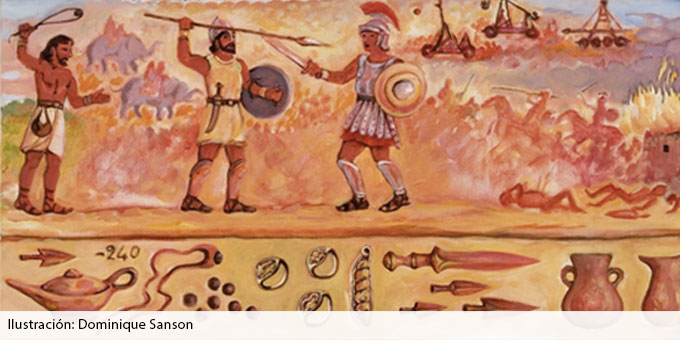Legal & Real Estate
Home, Garden & Decoration
Global Topics
Inside Ibiza
Health & Wellness
Ibiza Optimista
Published in Ibicasa Magazine on 15/02/2018

At around the same time Rome established its own republic after overthrowing its monarchy. Rome was an aspiring empire that vied with Carthage for supremacy of the seas and domination of trade. Over the centuries tensions rose between the two cities and war finally erupted in 264 BCE. A ferocious struggle ensued over the course of three Punic Wars and, although Carthage started as the stronger power, the scales of fate tipped in Rome’s favour. The deep-seated enmity between these two Mediterranean cultures can perhaps be epitomized by their two most famous generals: Hannibal of Carthage and Scipio of Rome. They were the nemeses to each other and the protagonists in our story. How did these larger events play out in Ibiza? Quite vividly, as we shall see. All three Punic Wars affected the island, the first indirectly, the second directly and the third disastrously.



In 218 BCE, contention over Iberia sparked the second Punic War, with Ibiza’s geopolitical relevance drawing her into the fray. Famously, Hannibal marched his Carthaginian army into Italy. This prompted his archrival Scipio to invade Hispania, but along the way his attention was diverted by a tempting war prize: Ibiza - a prosperous, strategic island crowned by a fortified city. However, after besieging Ibosim for three days in 217 BCE, Scipio quickly realized its walls could never be breached. Instead, he redirected his forces to raid the countryside, reaping booty, (according to Livy) that was the equivalent of a year’s plundering in Hispania. This was undoubtedly an exaggeration, but the claim does shed light on Ibiza’s prosperity in Punic times. The Romans never attempted another siege, but Ibiza, loyal polity that she was, continued to participate in the war effort by providing manpower, money and a safe harbour for Punic vessels. In fact, Ibiza was second only to Carthage in funding the war, having minted 8% of all the silver coins used to support the effort.

This is the second in a continuing series of articles on the history of Ibiza that will be published in subsequent editions of Ibicasa.
Related Articles
.jpg?locale=en)
Helen Sadler: The Magic of Her Art
What separates a true artist from someone who just happens to have some painting or drawing ability? When you meet a true artist you sense something magical about them, and... READ MORE
What separates a true artist from someone who just happens to have some painting or drawing ability? When you meet a true artist you sense something magical about them, and that’s how you feel when you are with Helen Sadler. She’s free-spirited yet serious; open yet mysterious. In short, she is a... READ MORE

Ibiza’s History - Part III: The Goddess...
Religion was a cornerstone of the ancient world. To understand history in all its nuanced complexity, we must contemplate not only the outer events of wars and statecraft, ... READ MORE
Religion was a cornerstone of the ancient world. To understand history in all its nuanced complexity, we must contemplate not only the outer events of wars and statecraft, but also the spiritual underpinnings that stirred and sustained early societies. Ibiza, as evidenced by abundant material rem... READ MORE
.jpg?locale=en)
Ibiza’s History - Part VII: The Moors
The arrival of Moorish culture in 902 breathed new life into an island adrift on the seas of oblivion. Ever since the shadowy withdrawal of the Byzantines, sometime in the ... READ MORE
The arrival of Moorish culture in 902 breathed new life into an island adrift on the seas of oblivion. Ever since the shadowy withdrawal of the Byzantines, sometime in the 7th century, Ibiza had languished outside the realm of established governance. What the island’s geopolitical status might ha... READ MORE
.jpg?locale=en)
Ibiza’s History - Part IV: The Gods of ...
The gods of Antiquity thundered out from the heavens, brandishing lightning bolts and defeating all foes... or so the mythological cliché goes. In fact, the ancient world v... READ MORE
The gods of Antiquity thundered out from the heavens, brandishing lightning bolts and defeating all foes... or so the mythological cliché goes. In fact, the ancient world view encompassed a remarkable scope of masculine archetypes. The attributes they ascribed to their male deities ranged from th... READ MORE
© Copyright 2024
Ibicasa Home and Services.